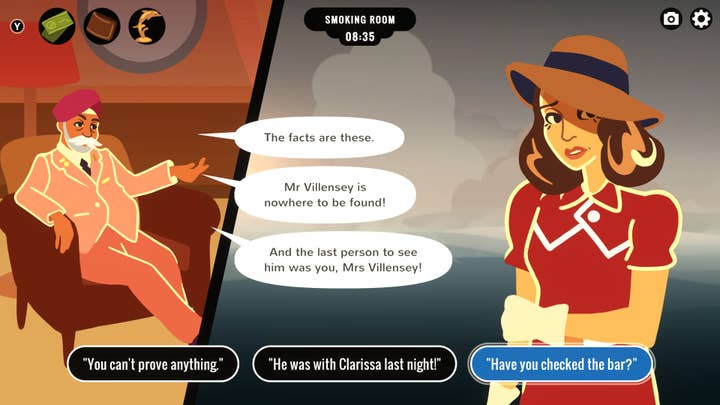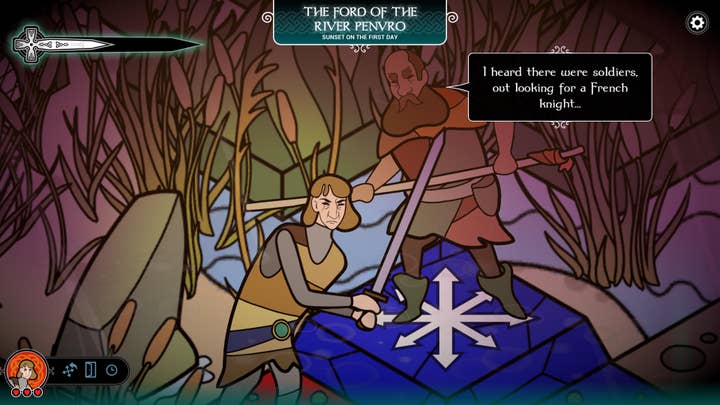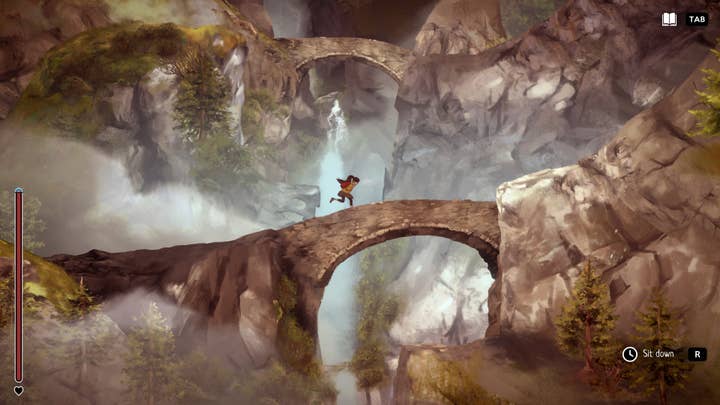The fluctuating scope of Inkle's games
Co-founder Jon Ingold discusses the ambition behind upcoming release A Highland Song, and how to source writing from your community in an honest way
Sign up for the GI Daily here to get the biggest news straight to your inbox
At first glance, A Highland Song is atypical of Inkle's style when it comes to the games it makes.
For a start, there's considerably less text, and there are more traditional gameplay mechanics, form the rock-climbing platforming at its core to the rhythm-action style sections. In fact, it's the first game Inkle has made that features a 'jump' button.
It's not quite what you'd expect from the studio that brought us 80 Days, the Sorcery series, or even the archaeological adventure Heaven's Vault. Yet co-founder Jon Ingold tells us the UK studio's titles always strive to explore the spectrum between gameplay and narrative, and A Highland Song is no different.
"People often describe us as a narrative-focused studio, and I get where that's coming from, but I always feel that's not quite right because there are lots of narrative games out there that are really just a story," he tells GamesIndustry.biz. "You're clicking through a story, maybe making some mild choices, but really you're just pushing forwards the whole time or solving puzzles to get forward in a linear way. And that's not a bad thing, that's just the way those games are designed, but that's something we very consciously don't do."
Ingold says that every Inkle title has something players can be skilled at, which helps to make the experience feel more interactive. The prime example is 80 Days; the resource management title dictates your funds and thereby governs which routes are open to you. Equally, choose too rough a route and Phileas Fogg's health deteriorates, which could result in him failing to complete his journey around the world. The gameplay affects the story and vice versa, and this is vital to Ingold and his team.
"To have those two things be functioning together as part of the same machine, so it is a story and it is a game but you couldn't take one away, that's always been our goal," he says.
And this is still the case with A Highland Song, the tale of a young girl running away from home and trying to reach the sea. This time, part of the narrative is delivered by the character reacting to the player's actions, responding every time you stumble and commenting on each discovery you make.
"Again, it's that idea that the narrative is happening inside the gameplay and the gameplay is happening inside the narrative. In that sense, it's very much an Inkle game. It's just that the presentation of that narrative and the way you drive it as the player… you're not making as many text choices, although there are some, but you're making a lot more choices in how you move around in the world. It's definitely got a different balance to it, but it's got the same heart and soul."
We're speaking to Ingold ahead of his talk at Develop:Brighton, where he'll be delivering a keynote on creating richer and replayable gameplay narratives. In a previous Develop talk, Ingold discussed the work that went into making Overboard replayable, and hinted that this title might form the basis of future Inkle games.
Released in 2021, Overboard is a short title in which you play a woman who threw her husband overboard during a trans-Atlantic crossing. Players guide her decisions to help her convince everyone on board that she's innocent, or at least keep them guessing until you safely make port.
"To have story and gameplay functioning together, so you couldn't take one away, that's always been our goal"
It was developed in just two months, and Ingold told attendees of his previous talk he was keen to further explore this shorter, more focused format – but that didn't quite pan out. As soon as Overboard was finished, he began writing a follow-up but found himself burned out and struggling to "capture lighting in a bottle a second time." After six months, he decided to shelve the project and has instead been working on A Highland Song with fellow co-founder Joseph Humfrey, the game's lead designer and the rest of that game's team.
"I still love that idea of making short, quick, inspired games," Ingold says. "Once A Highland Song comes out, which should be later this year, that's probably what we'll do next. There's not much enthusiasm between me and Joe for another epically long game. I think we want to do something a bit simpler, a bit quicker, so we'll probably go back to Overboard-sized games, if not necessarily that universe or that gameplay mechanic."
He continues: "When Joe started work on Highland, he said very explicitly at the time, 'I really don't want to make anything as big as Heaven's Vault again, here's a nice simple game about exploring the highlands, it'll be really quick to do.' And it hasn't been at all," Ingold laughs. "It's been quite a difficult project, and it's taken about four years."

Inkle is also exploring how to follow up on a crucial element of its 2020 release, the King Arthur-themed turn-based strategy game Pendragon. During development, the studio held a writing competition to source campfire stories for the knights of the round table to tell each other between adventures.
The idea occurred during the COVID-19 lockdown, when Ingold was struggling creatively and knew that others would be too. He wanted to give them an outlet, but was also keen to avoid exploiting people for free labour.
After speaking to fellow writers about how to run such a competition, the studio announced what it was planning to do, with the promise of payment for the winning entries (more on this later). Ingold says people were "naturally wary" about the initiative, but the overall response was positive.
"I think we got 500 entries of varying quality," he says. "I forget the numbers because it was a long time ago, but I think we were going to pick ten to 15, and we ended up picking 30 or 40 because I just couldn't choose.
"It was just a wonderful experience. I was reading through these things and finding so much variety and inspiration, so many clever little ideas, and then the ones we eventually settled on, some were by established game writers, some were by friends who knew the sort of thing we wanted, and some were by people who had never written before. One person submitted an entry they'd put through Google Translate because they only spoke, I think it was Brazilian Portuguese. The words were not brilliant because it was autotranslated, but the actual story was fantastic."
"It's that idea that the narrative is happening inside the gameplay and the gameplay is happening inside the narrative. In that sense, it's very much an Inkle game"
The studio continued this with Overboard. One character is a bad poet, so Inkle put out a call on Twitter for people to send just two lines of bad poetry. It received thousands, and used the best in the game – to the point where Ingold believes there are more 'bad poets' in the game's credits than actual developers. Inkle is also working on something similar for a project that will be announced later this year.
Such competitions are not unheard of, but have proven to be controversial. Ubisoft was lambasted when it teamed up with Joseph Gordon-Levitt's HitRecord to source music for Watch Dogs: Legion and worldbuilding elements for the still-MIA Beyond Good & Evil 2, with folks arguing the AAA company was exploiting its community by getting them to work for free. How did Inkle avoid the same criticism?
"It's a hard problem, because you are asking people to do something speculatively," Ingold says. "The reality is, when you're a writer you do an enormous amount of speculative work whatever writing industry you're going into. I know people always say that you shouldn't do things for exposure when you're new, but the truth is I can't think of a single writer who didn't do free work in order to get started and to learn their craft. It's just part of the journey. The question is, how do you avoid being exploited?
"For us, the important thing is that we're not Ubisoft. We're not making a game with a billion-dollar budget. Ubisoft can afford to pay £100 to everyone who contributes to their games, they wouldn’t even notice. It would mostly be a tax administrative issue for them. We really can't, and I think people understand that. And it's a very different thing being asked to do work for a massively grossing company that's banking its money for shareholders, and doing a bit of work for an indie game that may or may not break even. Those are genuinely different propositions."

Ingold adds that Inkle was careful to be respectful of people's time. For Overboard, the team just wanted two lines of poetry from each person; for Pendragon, they urged people not to spend more than a couple of hours on their story. And, crucially, the copyright remains with the original writer. People can print their story elsewhere – and many did (the competition involved using Inkle's writing tool, Ink, and the output can be exported to Itch.io).
"You have to be transparent and let people make the decision for themselves," Ingold says. "Ultimately, if somebody thinks the terms are okay, and they want to write something, that's great. If they say 'No, I'm not giving you my incredible story idea, you're an evil company, it's mine,' that's also fine. And I think we got it right with this [Pendragon]."
Looking beyond the upcoming release of A Highland Song, Ingold is still divided about the scale of game he wants to work on.
"Part of me wants to make a really epic game," he says. "It doesn't need to be 100 hours long – I don't have time for long games as a player, so I don't want to make them either – but something that feels big and AAA and animated and mocapped. Something that could do the Inkle narrative thing on a huge scale. And then the other part of me thinks life is too short for grand failures or grand epic projects.
"What I really enjoy is the fast ramp at the beginning of a project when you're discovering what it could be, and I like finishing and releasing things. So I think my happiest place will always be these short to medium length games. And I like the fact [that] people finish them. Someone might love Heaven's Vault but they might not finish it because it's 20 hours of their time and there's always someone competing for your attention. Nobody gets halfway through Overboard, everybody finishes at least one run."
GamesIndustry.biz is a media partner for Develop:Brighton 2023. This interview was arranged ahead of Ingold's keynote session on Thursday, July 13
Sign up for the GI Daily here to get the biggest news straight to your inbox

